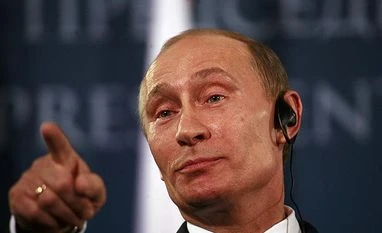President Vladimir Putin hailed the nation's economic performance in a marathon TV show today, pointing at the ruble's recovery as a sign of a renewed investor confidence in Russia.
Speaking in a call-in show with the nation televised live, Putin said the nation's economic performance has remained strong, despite Western sanctions slapped on Russia over the Ukrainian crisis and a slump in global oil prices.
He noted a 3.7-per cent increase in agricultural production and low unemployment, but acknowledged that an 11.4% annual inflation rate has put a strain on consumers' budgets.
He pointed to the ruble's recent recovery following its sharp devaluation last year as a sign of the Russian economy's resilience. He said that while an increase in oil prices had played a role in the recovery, the currency has strengthened more significantly than the oil factor would indicate, reflecting investors' renewed confidence in the Russian economic performance.
Putin said the sanctions have given Russia a strong impetus to diversify away from its heavy reliance on oil and dependence on imports, and would encourage it to develop high-tech industries and boost domestic agricultural production.
"We must use the current situation to reach new levels of development," he said.
Putin added that the country can overcome any challenges if it remains united.
"If we preserve a stable situation in domestic politics, preserve the current consolidation of society, we shouldn't fear any threats," he said.
Alexei Kudrin, who served as Russia's finance minister in 2000-2011, warned in his question to Putin that current economic policy does not allow Russia to achieve stable economic growth.
Kudrin earlier estimated that Russia's annexation of Crimea and the retaliatory Western sanctions will cost Russia up to $200 billion in the next three years.
Putin acknowledged the need for tight budget policies, but added that the government should be careful not to hurt the population. "If we want people to trust us, we need to have the heart," he said.
Speaking in a call-in show with the nation televised live, Putin said the nation's economic performance has remained strong, despite Western sanctions slapped on Russia over the Ukrainian crisis and a slump in global oil prices.
He noted a 3.7-per cent increase in agricultural production and low unemployment, but acknowledged that an 11.4% annual inflation rate has put a strain on consumers' budgets.
More From This Section
Official estimates are that Russia's economy will shrink by 3 to 5% this year in its steepest decline since Putin took office 15 years ago, but Putin said the slump would likely be less significant.
He pointed to the ruble's recent recovery following its sharp devaluation last year as a sign of the Russian economy's resilience. He said that while an increase in oil prices had played a role in the recovery, the currency has strengthened more significantly than the oil factor would indicate, reflecting investors' renewed confidence in the Russian economic performance.
Putin said the sanctions have given Russia a strong impetus to diversify away from its heavy reliance on oil and dependence on imports, and would encourage it to develop high-tech industries and boost domestic agricultural production.
"We must use the current situation to reach new levels of development," he said.
Putin added that the country can overcome any challenges if it remains united.
"If we preserve a stable situation in domestic politics, preserve the current consolidation of society, we shouldn't fear any threats," he said.
Alexei Kudrin, who served as Russia's finance minister in 2000-2011, warned in his question to Putin that current economic policy does not allow Russia to achieve stable economic growth.
Kudrin earlier estimated that Russia's annexation of Crimea and the retaliatory Western sanctions will cost Russia up to $200 billion in the next three years.
Putin acknowledged the need for tight budget policies, but added that the government should be careful not to hurt the population. "If we want people to trust us, we need to have the heart," he said.
)